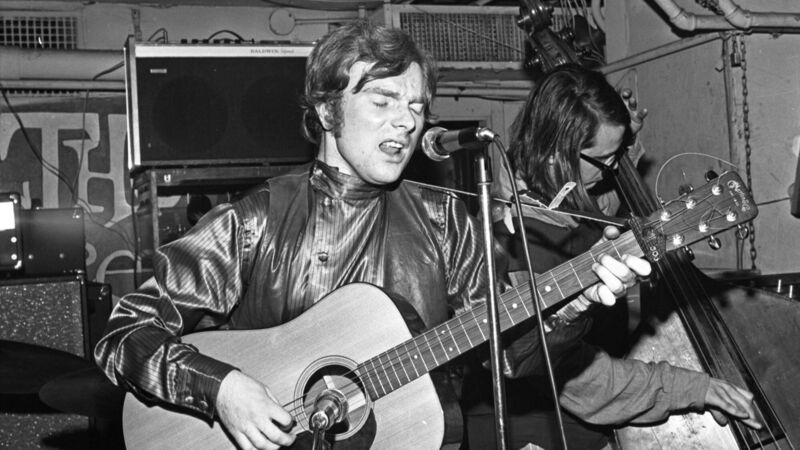Tom Dunne: Let the debate begin - what's Van Morrison's best album?

Van Morrison in New York in 1969, in the midst of what was a very creative period for the Northern Irish genius. (Picture: PoPsie Randolph/Michael Ochs Archives/Getty)
When I was young and had no sense – not a time-sensitive condition in my case but still – I was asked a difficult question for a magazine article: Van’s best album?
“Best of Van, Vol 1,” I answered without hesitation or even a tiny nod to Alan Partridge. The howls of derision still ring in my ears.
The “correct” answer, in a chin-stroking “knows music” kind of way is Astral Weeks. Another acceptable answer is Moondance, the far more commercial, catchy, accessible follow-up that featured the title track and ‘Into the Mystic’.
You’d be judged on Moondance though. Anything other than Astral Weeks reveals weakness in your character. People will suspect you struggled with the more “difficult” Radiohead stuff too.
Soon the music police will suggest you stick to your Buck’s Fizz albums and leave the “proper music” to us adults.
Well, that’s how the music snob wisdom goes. And if you get that level of abuse for choosing Moondance, or Veedon Fleece, or Saint Dominic’s Preview, imagine the death threats I got for “Best of Van, Vol 1”. Thank God it was too early to be cancelled.
But, not to poke the ashes, there was some wisdom in my madness. I had, at the time, just spent eight years at the business end of the music industry. Signed, dropped, signed again, 14 US tours, etc. The value of selling records or not selling records was something I was acutely aware of.
Van was selling records, but that record was Best of Van, Vol 1. It had spent four and half years in the US chart and sold 4 million copies in the US alone.
As of today, Van’s 44 studio albums, 7 live albums and 9 compilations have sold 16.8 million. The Best of, Vol 1, is responsible for an astonishing 6 million of that total.
It transformed Van’s career. Prior to that, his chart successes had peaked in the very early 1970s. He’d become one of those acts that labels liked to have but whose records didn’t really sell. A bit of a luxury signing. Until the Best Of hit town.
It was wonderfully compiled – he wasn’t involved - and it wasn’t chronological. There was artistry in the song flow.
Listeners the world over thought, “Wait! Did he write that one too?” Brown Eyed Girl, Moondance, Bright Side of The Road, Gloria, Wonderful Remark, Domino, Cleaning Windows, Did Ye Get Healed?
For a time, I thought it was being supplied free with all cars. Every car I got into from 1990 to about 1995 had a copy. But I wasn’t complaining.
It did what all best-of compilations should do; it sent you looking for his other albums. Van moved from playing Olympia-sized venues to playing arenas.
Yes, ask Van his own personal favourite. Might he reply, “the one that reinvented my career? The one that allowed me to keep going?”
The Beautiful South’s Carry on Up the Charts had a similar effect on their career in 1994. Their sales too were waning when they arranged their singles chronologically, added Everybody’s Talking, and stuck it out in time for Christmas.
It went five times platinum, was Christmas Number One, became the second-biggest album of the year (despite only six weeks of sales in that year, 1994), and made its way, people said, into one out of every seven UK homes. Indie music had never been so commercial.
A best-of had a similar effect on the career of The Eagles. Prior to Eagles 71-75, their career was a little patchy: four albums to date but nothing that might trouble Michael Jackson.
The Best Of redefined the perception of the band, Desperado became a hit, and it sold 38 million copies, second only at the time to, well yes, Thriller.
Industry types see best-ofs as an opportunity to “sand away the quirks” and “crystalise the essence”.
This offends purists, but the figures speak for themselves: Queen (20.6 million sold), Madonna (19.8), Abba Gold (21.6), Bob Marley (22.9) and The Beatles (23.3). Elton John, Billy Joel, and Tom Petty are no slouches either.
Of these, Bob Marley’s Legend is the most remarkable. He was a cult artist prior to it. But Irishman Dave Robinson, previously of Stiff Records, then at Island, took it upon himself to compile the songs and “soften” his image. It is now the best-selling reggae album of all time.
Astral Weeks is still there for you, BTW!



